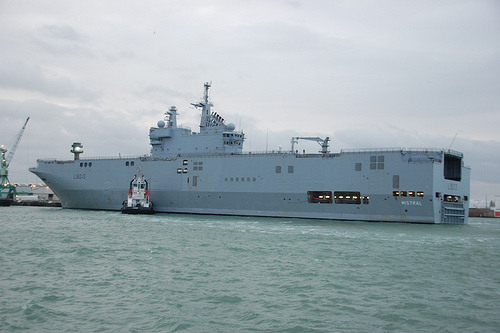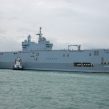
Russian Hard Bargaining Delays Contract On French Mistral Warships
Publication: Eurasia Daily Monitor Volume: 8 Issue: 54
By:

Contract negotiations on the French Mistral-class warship sale to Russia are moving into the endgame. The scenario envisages building two ships in France for sale to Russia, and selling licenses for two more ships to be built in Russian shipyards, “modernizing” these in the process. Moscow seems confident of playing the stronger hand. French President Nicolas Sarkozy’s team is overcommitted to this deal with Russia, and in dire political straits at home.
Moscow raised some unexpected demands in the lead-up to the meeting of Defense Ministers, Anatoliy Serdyukov and Gerard Longuet, on March 16 in Paris. While Serdyukov (as minister since 2007) has participated in the Mistral negotiations since their inception in 2009, Longuet is unfamiliar with this and other defense issues. Sarkozy moved him abruptly into this post from that of Senate majority leader as recently as February 27, 2011. Longuet’s immediate predecessor, Alain Juppe, only spent three months as defense minister (November 2010-February 2011). On January 25, Juppe signed with Russian Deputy Prime Minister, Igor Sechin, the inter-governmental agreement on the Mistral sale (EDM, January 3, 4, 26).
The French were hoping to sign the sale contract for two warships by April 30, and follow up with the licensing contract for Russia to build two more ships. However, Moscow’s unexpected demands are casting doubt on the time-frame for the first contract. Serdyukov and Longuet only spent 40 minutes on the Mistral issue at their March 16 meeting, merely registering the disputed points.
At this stage, Russia offers to pay 980 million Euros ($1.37 billion) for the two ships. In December 2010, however, the Russian Navy’s deputy commander in chief, Vice-Admiral Nikolai Borisov, had signed a protocol with the French side, setting the price at 1.15 billion Euros ($1.61 billion), according to Russian media reports. That amount covered some (undisclosed) logistical equipment and technical assistance, on top of the 980 million basic price. By early March, however, Moscow media reported Borisov’s premature transfer to the reserves at his own request. On a related issue, Russia wants the price of user licenses and technical documentation for some on-board installations to be included in the sale contract; whereas France would sell these separately for an additional 90 million Euros ($126.6 million), which would bring the overall price to almost 1.25 billion Euros ($1.75 billion) (Kommersant, March 3; Interfax, March 4; RIA Novosti, March 16).
Russia demands “guaranteed” post-delivery servicing by the French for those two ships. Apparently, the Russians want the servicing included as a binding obligation and within the sale price, whereas the French side presumably takes a different view (RIA Novosti, Interfax, March 16).
Moscow insists on the transfer of state-of-the-art electronics with the Mistral-class ships to Russia. As the First Deputy Defense Minister (responsible for armaments), Vladimir Popovkin, recently confirmed, Russia particularly covets the SENIT-9 combat information system. This is French-proprietary, except for the links to NATO codes. The Russians claim that they need highly sophisticated electronics for interoperability of their ships with NATO navies. Moscow has all along threatened to pull out of the Mistral deal (and, presumably, revert to a tender) unless Paris guarantees the transfer of those electronics to Russia with the ships (Voyenno Promyshlennyy Kuryer, March 3; Le Figaro, March 15).
Sarkozy and his government insist that the Mistral sale to Russia supports employment at French shipyards. This argument is cited to international observers as well as to French voters. Moscow, however, is far from acting as helpfully as Paris claims to be the case. Russia’s United Shipbuilding Corporation (OSK) wants a share of construction work on the first two ships, which France would expect to build itself. The OSK seeks a 20 percent share on the first ship and a 40 percent share on the second ship. Sechin, who signed the inter-governmental agreement on the Mistral sale as Russian deputy prime minister, is also OSK’s chairman.
During his March 16 Paris visit, Serdyukov announced that Rosoboronexport has been designated as the defense ministry’s procurement agent on the first two Mistral-class ships, to be built in France. As part of the conditions for signing the contract, he asked that some of that work be subcontracted to OSK. The French side would like to distinguish clearly between a contract for two French-built ships to be sold to Russia and a contract for licensing the construction of two ships in Russia. Such distinction would (among other considerations) make it possible to keep the construction work in France for the first two ships. The Russian side would like to blur that distinction by signing one lump contract that would cover all the four ships (RIA Novosti, Interfax, Le Figaro, March 16).
These and other disagreements, commercial and technical, are slowing down the contract-drafting process on the Mistral sale. Politically, however, the two defense ministries are rapidly developing their relations. Serdyukov agreed in Paris with his new counterpart, Longuet, on a list of activities, including an air force command-and-staff joint exercise, a French naval visit to Russia, and separate visits there by Longuet and the French ground forces, naval, and air force commanders in chief, all during the current year.




